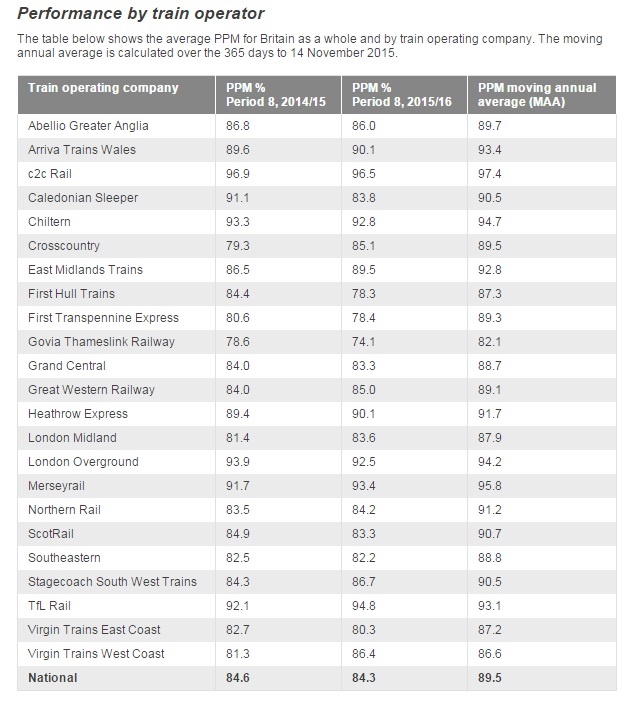23.11.15
National performance worsens – three TOCs sub-80% in period 8
Performance in period 8 has dived to 84.3% after staying around 90% over the past three months, as seasonal issues take their annual toll.
The figure, covering 18 October to 14 November, is 0.3 percentage points down on the same period last year.
Three operators now have performance figures below 80%: Govia Thameslink Railway, First TransPennine Express (its northern section has the worst figures) and First Hull Trains.
GTR’s performance is particularly dire at 74.1%, down from an already-low PPM of 82.9% in period 7. It was, once again, the worst-performing operator. Since taking over Southern services, it has been the UK’s largest single franchise. During the same period last year, its PPM was considerably higher, but still poor, at nearly 79%.
And the worst-performing operator within its network, Gatwick Express, almost fell below a PPM of 70% - the only TOC to do so.
This also follows on from ORR figures released last week, at which point GTR recorded the worst quarterly punctuality figures for the routes it runs since 2004-5.
First Hull’s performance figure of 78.3% also contrasts sharply with period 8 last year, during which it recorded a ppm of 84.4%.
And this is the second time the performance of Great Western Railway (GWR), the new branding for First Great Western, was recorded following last period’s figure of 88.7%.
Its performance has now crashed even further to 85%, one percentage point below last year’s PPM – suggesting that it may still be a slow start for the revamped operator.

Once again, c2c bagged the top spot with a PPM figure of 96.5%, significantly ahead of other operators. TfL Rail took the second spot with a PPM of 94.8%, building on the operator’s success in the last few periods.
Most of the other operators maintained a steady performance compared to the same period last year, with figures only very marginally above or below 2014.
But a few of them stood out positively: Virgin Trains West Coast and London Midland recorded performance figures of around 86% against last year’s 81% PPM, for example.
Virgin’s West Coast route also significantly reduced its incidences of cancellations and significant lateness, down to 2.9% from last year’s 6.3%. Its sister company on the East Coast was not as successful, however, recording a cancellation figure of almost 6%.
But other high cancellation figures of around 6% within GTR and Grand Central were significantly outshone by First TransPennine Express, which recorded a whopping 9.4% of cancellations and lateness. This was significantly higher than the 6.3% during last year’s period 8.
These cancellations are recorded if a train is cancelled at origin or en route, if its originating station is changed, if it fails to make a scheduled stop of it is more than 30 minutes late.
These delays are usually mostly attributable to Network Rail, which was once again responsible for 59% of train delays of three minutes or more due to infrastructure, operations or external issues.